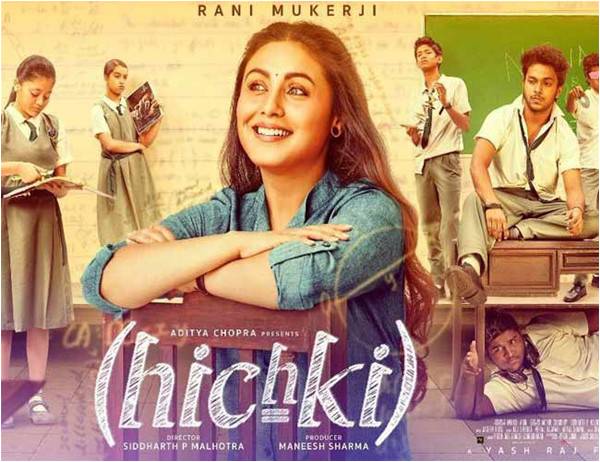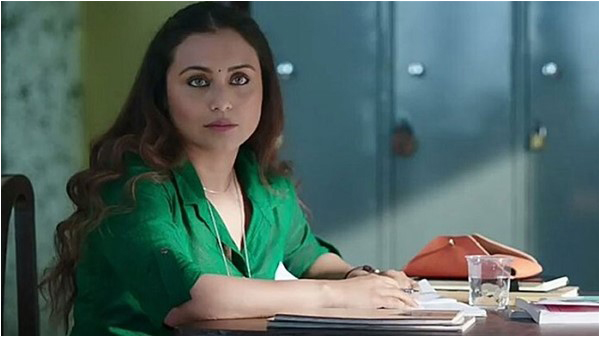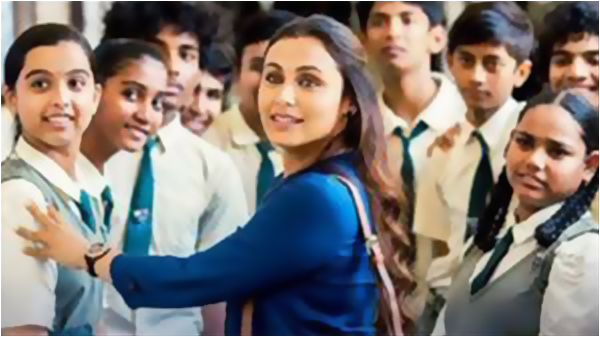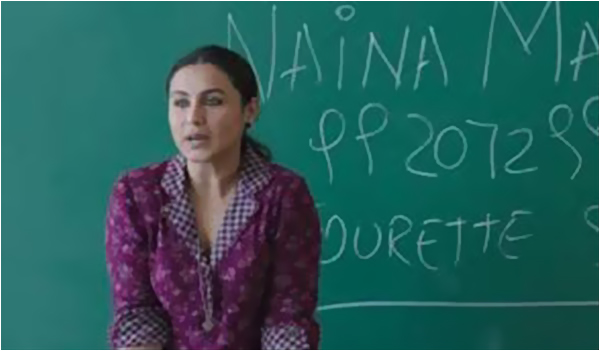
What makes Hichki work despite its many cliché-laden hiccups is Rani Mukerji. Making a comeback, four years after Mardani it is the actor’s undoubted prowess that carries the film on her shoulders, despite the glaring predictability of the script.
Predictability is perhaps predictable in the film given its theme: a young woman who with Tourette’s Syndrome trying to fulfill her dream of becoming a teacher. It ticks all the feel-good boxes, barring which any film centering around the subject would fail.
But what happened to the good old plot twists? Notice the word ‘good’ here. In all quintessential tales you root for the hero because they face the stumbling blocks falling en route to glory, left, right and centre.

It is perhaps that thrill that Hichki lacks. But it more than makes up for it with a strong emotional coefficient.
Naina Mathur (Rani Mukerji) suffers from Tourette Syndrome, a neurological condition which causes a speech defect especially when the nerves get the better of her. This defect, which she has had since childhood, is characterised by sounds that she makes to interrupt her own speech.
But Naina, inspired by a teacher who played the motivating role for her that she wants to play with others, wants to become a teacher. She has firsthand experience of how one’s world can change amidst all kinds of adversaries, and wants to give to others what she herself received all those years ago.

Even so, it is that very adversary that she had been taught to overcome as a child that becomes the biggest antagonist for her.
Naina’s Tourette Syndrome doesn’t allow her to land a teaching position for over five years. Not until a top Mumbai school gives her a class full of ‘unruly’ teenagers to take care of.
The challenges that she was to, and does, face are as expected. But Naina takes them in her stride.
In a bid to unravel the journey of a teacher suffering Tourette Syndrome, Hichki also manages to underscore the many other flaws marring the educational system: classism, orthodox parenting and commodification of education itself.
The problem, however, remains that we’ve all seen these being demonstrated, and arguably in more comprehensive packages.
A remake of the Front of the Class, which itself was adapted from Brad Cohen’s autobiography How Tourette Syndrome Made Me the Teacher I Never Had, the film adds the archetypal South Asian sensitivities to the original script, making it palatable for the local audiences.
Director Siddharth P. Malhotra has made sure that he ups the ante on what many in the audience might believe to be a clear attempt to cash in on melodrama. At points in the film it becomes too obvious that everything possible has been done, and the setting has been fabricated accordingly, such that the audience can be encouraged to bawl their hearts out.

This is precisely both the glaring strength and weakness of the film – again, depending on which member of the audience is watching it.
There is no questioning the inspiration present everywhere in the storyline. But it is their narration and depiction, often detached from any shred of realism, that becomes problematic while gauging Hichki’s final impact.
Hichki is no Taare Zameen Par. It is not even Rani Mukerji’s best ever performance. But neither stops it from being a film that could work if you belong to the targeted demographic, and can overlook the many hiccups.
Hichki is for teachers – and those that aspire to teach – students, parents and educationists of all kinds. It is also for those that like the accelerator pressed on emotionality, and prefer to detach themselves from their worlds. Most of all though, the film is for anyone looking for a push from behind to continue seeking their life’s goals.
Predictability is perhaps predictable in the film given its theme: a young woman who with Tourette’s Syndrome trying to fulfill her dream of becoming a teacher. It ticks all the feel-good boxes, barring which any film centering around the subject would fail.
But what happened to the good old plot twists? Notice the word ‘good’ here. In all quintessential tales you root for the hero because they face the stumbling blocks falling en route to glory, left, right and centre.

It is perhaps that thrill that Hichki lacks. But it more than makes up for it with a strong emotional coefficient.
Naina Mathur (Rani Mukerji) suffers from Tourette Syndrome, a neurological condition which causes a speech defect especially when the nerves get the better of her. This defect, which she has had since childhood, is characterised by sounds that she makes to interrupt her own speech.
But Naina, inspired by a teacher who played the motivating role for her that she wants to play with others, wants to become a teacher. She has firsthand experience of how one’s world can change amidst all kinds of adversaries, and wants to give to others what she herself received all those years ago.

Even so, it is that very adversary that she had been taught to overcome as a child that becomes the biggest antagonist for her.
Naina’s Tourette Syndrome doesn’t allow her to land a teaching position for over five years. Not until a top Mumbai school gives her a class full of ‘unruly’ teenagers to take care of.
The challenges that she was to, and does, face are as expected. But Naina takes them in her stride.
In a bid to unravel the journey of a teacher suffering Tourette Syndrome, Hichki also manages to underscore the many other flaws marring the educational system: classism, orthodox parenting and commodification of education itself.
Hichki is no Taare Zameen Par. It is not even Rani Mukerji's best ever performance. But neither stops it from being a film that could work if you belong to the targeted demographic
The problem, however, remains that we’ve all seen these being demonstrated, and arguably in more comprehensive packages.
A remake of the Front of the Class, which itself was adapted from Brad Cohen’s autobiography How Tourette Syndrome Made Me the Teacher I Never Had, the film adds the archetypal South Asian sensitivities to the original script, making it palatable for the local audiences.
Director Siddharth P. Malhotra has made sure that he ups the ante on what many in the audience might believe to be a clear attempt to cash in on melodrama. At points in the film it becomes too obvious that everything possible has been done, and the setting has been fabricated accordingly, such that the audience can be encouraged to bawl their hearts out.

This is precisely both the glaring strength and weakness of the film – again, depending on which member of the audience is watching it.
There is no questioning the inspiration present everywhere in the storyline. But it is their narration and depiction, often detached from any shred of realism, that becomes problematic while gauging Hichki’s final impact.
Hichki is no Taare Zameen Par. It is not even Rani Mukerji’s best ever performance. But neither stops it from being a film that could work if you belong to the targeted demographic, and can overlook the many hiccups.
Hichki is for teachers – and those that aspire to teach – students, parents and educationists of all kinds. It is also for those that like the accelerator pressed on emotionality, and prefer to detach themselves from their worlds. Most of all though, the film is for anyone looking for a push from behind to continue seeking their life’s goals.

